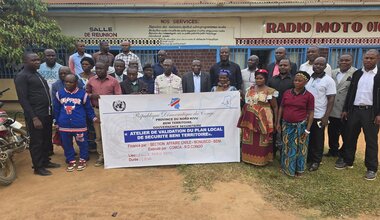Interview with the Under-Secretary-General for Peacekeeping Operations
Kinshasa, 24 January 2012 – During his official visit to the Democratic Republic of the Congo, the Under-Secretary-General for Peacekeeping Operations, Mr Hervé Ladsous, made the following statement in an interview with Radio Okapi, which is the radio of the United Nations Organization Stabilization Mission in the Democratic Republic of the Congo (MONUSCO).
Good morning Mr Hervé Ladsous, this is your first visit to the DRC since your appointment at the department of Peacekeeping Operations. What is the purpose of your visit?
It has been three months since my appointment. I was very keen on making one of my first field visits here, in the Democratic Republic of the Congo, in order to understand, discover, talk and also listen, and see what we can do better to help the Democratic Republic of the Congo through MONUSCO which, as you know, is the United Nations' second biggest mission in the world, to get out of its difficulties and to make progress towards a future that, in my opinion, is promising.
In accordance with the Security Council Resolution 1991, MONUSCO provided a logistical and technical support to the organization of the November 2011 elections. What are the United Nations considering doing to contribute to calming down the currently very tense political climate in DRC? This tense political climate is due to the fact that the results are challenged for some candidates.
There are indeed many lessons to learn from how the presidential and legislative elections took place. We are now expecting the provincial and local elections. And of course, the United Nations and MONUSCO are in support to ensure that this domestic policy process, which is a matter for the Congolese citizens' assessment, can develop under continually improved conditions. Therefore, there are lessons to learn, messages to listen to, and there are most likely measures to be taken in order to ensure that this critical process enable the national reconciliation to happen under better conditions; with respect for the rule of law, and with the objective of finding sustainable solutions for the country's future.
You have planned to visit Goma. Despite MONUSCO and the Congolese authorities' efforts, some armed groups like the FDLR remain very active in the eastern Congo. What are the United Nations planning on doing to permanently eradicate all these negative forces?
The Congolese State must indeed reaffirm its authority nationwide. So, there are a series of measures to be taken to ensure that all these armed groups stop causing damages, and firstly stop undermining the security and also the integrity of entire populations groups. The protection of civilians is therefore a major and central aspect of MONUSCO mandate. But, it is also important that the security sector reform, generally, and specifically the country's army, be able to reaffirm and to assume again its authority nationwide. And it is true that the situation is more complex in the east, and that measures must be taken to put an end to this state of lawlessness, because in fact that is precisely the situation today: a state of lawlessness that is simply not acceptable, and that is mobilizing the attention of the international community. There are the internal groups, and there are also, I would say, the multi-country groups. The Lord Resistance Army (LRA) for instance, which mobilizes the attention and efforts of several countries in the Central Africa region, and which mobilizes the attention of the African Union. So, yes, the State must reaffirm all its authority nationwide.
About MONUSCO, in practical terms, what are you planning on doing because this situation has been going on for a while? What are the required actions?
Listen, it is not simple. If it were simple, we would have already found the solution. It is not simple. MONUSCO does a lot, with the support of the entire international community, through the Security Council decisions. It is all about continued efforts, initiative and imagination. But we must make progress towards this direction.
The Congolese media are already wondering about the future of MONUSCO which mandate expires on 30 June 2012. What insights can you provide on this matter to the public listening to us on Radio Okapi?
I would say two things: first of all, it is the responsibility of the Security Council to make that decision. Secondly, I would say that the international community, through the United Nations, has made huge investments in what is happening in the Congo. So, we have to continue making progress, in accordance with the national authorities, to find the good solutions to consolidate the state and the rule of law, and to promote national reconciliation which, I think, is what everybody is working towards.
 UN
UN United Nations Peacekeeping
United Nations Peacekeeping




